- Home
- Franklin Horton
The Mad Mick: Book One of The Mad Mick Series Page 4
The Mad Mick: Book One of The Mad Mick Series Read online
Page 4
"I’ll give you a rifle," he said. "Nothing fancy, but something that will put meat on the table."
The boy's eyes got wide. "One of those fancy army rifles like you got?"
"Oh no. I give you something with a thirty-round magazine and you’ll be blowing off shots with no regard for aim. I’m going to give you a lever-action, something that will force you to pay a little more attention to what you’re doing."
"But you said I may need to defend myself," the boy said. "Don't I need something that holds a lot of bullets?"
"No. Most days, if you need thirty rounds to get yourself out of the shit, you might as well kiss your ass goodbye. A decent lever-action or bolt gun will hold off the bad guys until help arrives. That's all you need to buy yourself some time."
"Can I have it now?"
"You come back tomorrow, lad. You come early and we’ll put a meal in your belly. Then I'll show you how to shoot a rifle and take care of one. When I'm comfortable you're safe, I’ll send you home with the rifle and a box of shells."
“How long is one box going to last me?”
“When it’s empty, you come back and tell me what that box of shells put in the stew pot. I’ll refill you. Don’t you worry about that.”
4
The morning had warmed considerably by the time Barb reached the base of Jewell Ridge. JoAnn, lived on a small family farm with her father, who was in poor health and couldn't do many chores around the place anymore. Most of the work fell to JoAnn. Barb didn't know the girl well. She didn't know anyone here very well since she and her father kept mostly to themselves. She’d met the girl collecting firewood not long after the collapse.
Barb happened to be walking by on the road and heard the solid thunk of an ax in wood. She’d looked in the direction of the sound and saw a thin girl, exhausted and frustrated, trying to section a tree so she could carry pieces home. Barb, who like her father was usually willing to help those who were trying to help themselves, offered to lend a hand. JoAnn gladly took the help, figuring a girl of around her own age couldn’t be any threat. Had it been a man asking her the same question, JoAnn would have run for the house and hidden while her father threatened him with a shotgun.
Most of the houses in this the area of central Appalachia were built right on the road because there was such a shortage of flat land. The farms were nothing like the rolling pastures of North Carolina where Barb had been born. Farms here were often straight up and down the hillsides. Cattle created switchback trails for moving up and down the hills. JoAnn’s farm was the same way. The house was immediately off the side of the road with acres of wooded mountain land stretching out behind it.
Barb was just around the corner from JoAnn’s home when she heard a gunshot and a bloodcurdling scream. It was the voice of a young woman. JoAnn’s voice.
Barb bolted toward the scream, unslinging her rifle. She flew around the bend of the road without regard for what might be waiting on her. There, the tree-lined road opened up around JoAnn’s family home. She flicked off her safety and scanned as she moved, not seeing anything that concerned her, though the screams and yelling had not stopped.
The gate at the driveway was hanging open, which was unusual, and she went through it, running up the gravel drive. She was constantly scanning for cover, looking for a place to hide if she came under fire. The scream had turned to sobs and wailing. It was tortuous, listening to that, wanting to make it stop. It was all she could do not to burst around the house at full speed and try to fix whatever the situation was but she couldn’t get herself killed. That would help no one.
She flattened herself against the house and forced herself to slow down. She took several quick, deep breaths to calm her breathing. The cries of anguish were coming from behind the house, which Barb knew held the garden and a few outbuildings. She moved to the corner of the house, peered around a loose downspout, and saw a man struggling to pull JoAnn away from her father's body. Her dad lay collapsed in late-season beans, gangly limbs sprawling from a blood-soaked torso. Even if her dad was still alive, he wouldn’t be for long with the quantity of blood he was losing.
A second man stood among the dying tomato plants, a rifle dangling from his hand, while the other man attempted to subdue JoAnn. He was not paying any attention to his surroundings, apparently unconcerned that the gunshots and the girl’s screams might draw attention. He would not have a chance to learn from his mistake. Without any hesitation, Barb put the illuminated chevron of her rifle optic on the man’s center mass and sent two quick rounds into his body. He fell into a heap, arched, and died.
The crack of the gunshots startled both JoAnn and her attacker. His grip on JoAnn’s arms slipped and he backpedaled a couple of steps before falling on his ass. He landed on his slung rifle and was struggling to get it into firing position when Barb's rifle cracked again, the shot shattering his upper left arm. He cried out and tried to staunch the flow of blood but barely got a hand over the wound before another round caught him beneath the left eye. His head snapped backwards and he sagged into the soft dirt of the garden, a surprised look on his face.
JoAnn took this opportunity to scramble on all fours to her collapsed father. She cradled his head in her hands and repeated his name over and over, beseeching the creator to bring him back, but he was dead. Barb ran to the garden and checked both of the men she’d shot. They were dead as disco. She didn't recognize either of them.
She moved to the sobbing girl, placing a gentle hand on her shoulder. "Get up, JoAnn. We have to go. There could be others."
JoAnn’s dirty face was streaked from tears. Her expression said it all. She wondered how she could leave this man who had meant so much to her. How could she leave her dad laying there in the garden?
"He's dead,” Barb said. “There's nothing you can do for him now. He wouldn’t want you to die too. You know that."
When JoAnn didn't immediately get to her feet, Barb hooked an arm beneath JoAnn’s, hoisting her to her feet. "We have to go. Now!"
Barb tugged at the stumbling girl, trying to get her moving in the right direction. In trying to save her new friend, Barb failed to maintain awareness of her surroundings. She held her rifle in her weak hand, pointed uselessly upward as she used her stronger arm to tug at the grief-stricken JoAnn. When Barb's eyes finally went back to the road in front of her, she found a line of armed men waiting on them.
Her heart sank, but she was a fighter. She did not weigh odds. She fought out of reaction, out of pure instinct. She released JoAnn, the girl falling into the tall grass, and shifted the rifle back to her strong hand. Before she could get it shouldered, a blow like she had never felt before struck her in the center of her chest. Barb collapsed forward onto her face, gasping for breath. She was certain she now knew what it felt like to die. What it felt like to take a bullet to the chest and bleed to death with your face in the dirt.
It was agonizing.
There was a flicker of thought, the awareness that her dad might never know what happened to her. There was an awareness of how sad that would make him. Then rough hands grabbed her shirt and she was flipped over onto her back. Her hands were gathered in front of her and zip-tied together. Part of her wondered why they were bothering to bind her after inflicting what was surely a mortal wound. Then she noticed a man retrieving something from the ground beside her. It was an arrow with a round steel tip. A blunt arrow for hunting small game.
It was the last thing she saw before a hood was drawn over her head and cinched a little too tight around her neck.
5
Ragus walked backed down the paved mountain road with his fishing buddy, Dakota. Dakota had complained the entire time because Ragus insisted on walking so fast. Each time Dakota brought it up Ragus insisted he was in no hurry, but in truth, Ragus hoped to catch up with Barb again. He was certain if he had enough time with the woman he could win her over. Ragus had heard women jokingly say they wouldn't go out with someone if he was the last man on Earth. He wondered if B
arb felt the same way about him. If times continued to get worse and the death toll mounted, perhaps Ragus would be one of the few men remaining in her world. Surely that would improve his odds.
Ragus and Dakota were nearly to the bottom of the ridge when the gunfire broke out. At the first shot, Ragus was unconcerned, assuming a hunter must have shot at an animal. The next shots came in rapid pairs and Ragus immediately become more concerned. Conor taught Barb to shoot in double taps when killing mattered and time permitted. When it clicked in his brain that those shots must be Barb firing defensively, he bolted down the road without saying a word to his friend.
"Hey, wait up! Where are you going?" Dakota shouted after him.
When Ragus didn’t answer, Dakota picked up the pace. He couldn’t catch up to Ragus, though, who was in an all-out sprint to find the source of the shots.
Ragus knew which house Barb was headed to and slowed before he got there, knowing it lay around a blind corner. He eased around the bend, not wanting to run full tilt into the midst of a gunfight. He hugged the ditch line at the tight corner, which kept him closer to the concealment of the woods. He moved quickly but cautiously, more of the landscape opening up before him with each step. He raised his rifle and verified there was indeed a round in the chamber
He saw the horses first. Perhaps as many as a dozen. A single man leaned against a fencepost in the midst of the tied horses. Ragus raised his rifle and aligned his scope on the man. It was purely a reaction but his brain overruled acting on it. He hesitated. If there was a man for each of these horses, the shot Ragus fired would draw them back to him. He couldn’t fight off a dozen men, especially with a lever-action rifle. He needed to wait and see what was happening. He forced himself to retreat, backing away from the scene and receding into the shadows like smoke rising into a forest canopy.
In his retreat, Ragus heard flapping sneakers approaching on the road. He realized Dakota may not have understood to stop and wait. He was just trying to catch up with his fishing buddy. As quietly as possible, Ragus moved to intercept his friend before the man at the fence heard his flapping feet.
Dakota flew around the corner and was startled to find Ragus coming toward him. He started to cry out but Ragus intercepted the boy, clapping a hand over his mouth and muting him. Dakota tried to suck air, winded from running. He tugged at the hand over his mouth. Ragus shushed him with a finger raised to his lips. The gasping boy didn’t have the breath to put together a question but his expression made it clear he did not understand what was taking place.
Ragus pulled the confused boy from the road into the concealment of the woods, then leaned to his ear and whispered, "I think my friend Barb is in trouble. I think this is where those gunshots came from. I need to check on her. You stay here and don’t move.”
His eyes wide with fear, the boy nodded quickly. Ragus left him, scrambling through a dense underbrush of blackberry vines, tall pokeberry plants, and poplar saplings. He followed the fence line of the property, trying to make as little noise as possible. He looked where he put his feet with each step, trying not to step on anything that would announce his presence. While he wasn’t a warrior, he was a hunter. Moving through the woods stealthily, trying to keep yourself hidden, was a basic hunting skill. When he reached a point where he could see into the backyard, he found Barb bound and hooded. A man stood over her with a bow in his hands, inserting an arrow into a quiver.
Ragus felt a surge of panic. Had Barb been shot with the bow? If so, would she even survive without access to medical care? Seeing Barb in such a helpless state infuriated him. There were only two people he cared about in the world anymore and this indignity injured both of them. He clenched his hand tightly around the stock of the Henry rifle.
Despite the small caliber, carefully placed shots might still drop their targets. But how many carefully placed shots could he even take before those men were shredding the woods around him with their weapons? These men carried an assortment of weapons. There were a couple of bolt action rifles, but there were also modern military-looking rifles. He had no doubt that by the time he got off two or three shots, the remaining men would be laying down a shower of lead in his direction.
The men surrounding Barb slid hands under her bound arms and yanked her to her feet. She supported herself unsteadily but the two men did not take their hands from her. Ragus noticed a second hooded girl who must've been the friend Barb was visiting. He also saw several dead men he’d somehow missed. It would not surprise him to learn Barb might have killed them. It would certainly explain why they were treating her so harshly.
In his struggle to come up with a plan of action, Ragus recalled what Conor said when he gave him the rifle. He explained that some situations were not resolved by blindly throwing yourself into battle at the risk of your own life. Sometimes battles were won by delaying the worst outcomes until help could arrive. If he couldn’t immediately win this battle, perhaps he could at least pursue these men and leave a trail for Conor to follow. Then, together, they could wade in and take heads.
The assembly of men moved from the back of the house to the front, where Ragus could see them securing gear on horses. They hoisted Barb into a saddle and lashed her hands to the saddle horn. Ragus could not hear what was being said but saw a single man giving out orders. He had to be the leader of this group. On his word, they mounted up and plodded off in no great hurry, as if this were simply another routine stop on a long list of stops.
Knowing he had no time to waste, Ragus hurried back to Dakota, less concerned about stealth on the return trip. Branches and berry vines tore at his skin and clothes. Usually wary of snakes, he paid the ground no heed this time. He found his friend waiting on him, wide-eyed and terrified.
"What is it? What’s going on?"
"Kidnappers. They've taken Barb and the girl who lives at this house. There’s dead men back there too."
"Who is Barb, anyway? Why do you care?"
"Barb is Conor's daughter. The Mad Mick. The Irish guy who lives at the top of the hill in the old coal company headquarters. He’s my friend."
Dakota’s look of confusion vanished. The boy didn’t recognize the name but everyone on the ridge knew the wacky old Irish guy who lived in the coal company headquarters. Ragus took his arm and spoke to him intently.
"Listen, Barb said her dad was going to Johnny Jacks' house looking for horses. You need to head over there and tell Conor what happened. Tell him I'm in pursuit and I'll leave him a trail. You got it?"
Dakota frowned. "I’m not supposed to go anywhere but fishing. I’ll have to go by my house and ask my mother.”
Ragus lashed out and clubbed the boy on the side of the head. He grabbed him by the collar and pulled him close, leaning in. His words came through clenched teeth. "You go now and you go as fast as you can. Don’t stop anywhere until you find him. If something happens to her or if he doesn't get the message, I'll kill you and your mother when I get back. I am not joking."
Ragus shoved the younger boy away. The kid scrambled to his feet and took off running, his face red, tears pouring down his face. Ragus felt bad about hitting him but knew of no other way to convey the urgency of the moment. Relieved at getting the boy on the road, Ragus was overpowered by the urgency of Barb's situation. There was no time to think, organize, or plan. He just had to go. He slung his pack on his back, took his rifle in his hand, and loped off in the direction the horses had gone.
6
Conor McGuire was a man of contrast. While his bread and butter was violence and mayhem, he also loved the peaceful life of the country. He built bombs. He built assassination weapons. He was likely responsible for hundreds of deaths around the world. He also loved walking on a wooded road on a beautiful morning. It was, as he said, when his Irish came out.
He would let his guard down as much as a man of his background could and he would sing the ballads of his childhood and his homeland if he could remember the words. If he couldn’t scratch the lyrics from memory, he
would hum the tune to keep it alive. It was like blowing on an ember to keep a fire going. The fire, in this case, was the memory of Ireland. When the English, the Irish, the Scots, and the Welsh came to America in the eighteenth and nineteenth centuries, this was where they settled. West Virginia and Southwest Virginia reminded them of home. It did the same for Conor.
The morning warmed as the sun rose, arranging shimmering pockets of dappled light on the dirty roadway. With no traffic and no highway department, debris was building up. The ditches beside the road had filled with silt and rain, and now washed gravel and dirt into the pavement with each storm. Such impediments could cause a nasty wreck on a bicycle as Conor had learned on his last long trip. In the early days after the collapse he’d taken a multi-day bike trip to help the friend of a friend, and on his way home he’d hit a rock with his front tire, taking a nasty fall. Horses would be unconcerned with such debris. They could step over an obstacle in the same way Conor could.
Johnny Jacks was a local farmer who raised cattle and had a fondness for horses. He was in his mid-seventies now but, as Conor heard it, for the last forty years he was the guy who took in neglected and unwanted horses. A lot of people loved the idea of having a horse, but they needed things, and could be expensive to feed and care for. When horse owners hit hard times, horses were often one of the first things to suffer. Responsible horse owners recognized this and found people like Johnny Jacks to take the horse and care for it. Irresponsible horse owners often waited until neighbors complained to the police or animal control, often ending up charged with animal cruelty. Then they were forced by the court to get rid of their horse and they ended up with folks like Johnny Jacks.
Johnny never paid for horses. The deal was if he was going to take your horse and care for it, then you gave him the horse and all the tack for free. Johnny had plenty of land and he sowed several pastures in grass that made good horse hay, so feeding the horses had never been an issue for him. That summer, when society collapsed, farmers were in the same boat as everyone else. They might have livestock they could eat or barter but they had no fuel for the tractors. That made it a lot harder to take care of their farms.

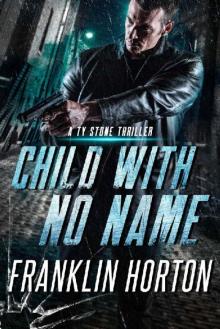 Child With No Name
Child With No Name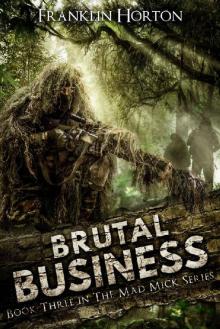 Brutal Business: Book Three in the Mad Mick Series
Brutal Business: Book Three in the Mad Mick Series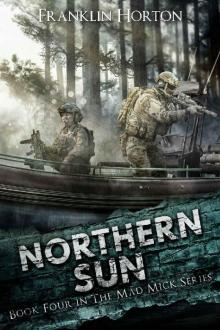 Northern Sun: Book Four in The Mad Mick Series
Northern Sun: Book Four in The Mad Mick Series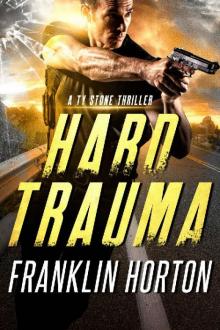 Hard Trauma
Hard Trauma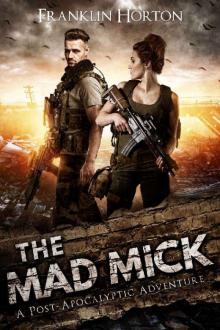 The Mad Mick: Book One of The Mad Mick Series
The Mad Mick: Book One of The Mad Mick Series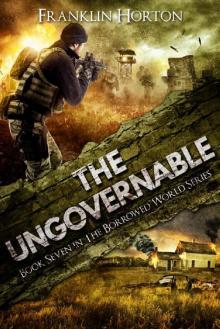 The Ungovernable
The Ungovernable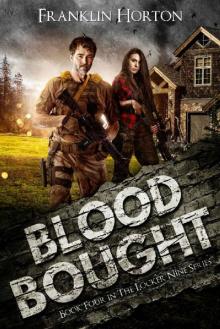 Blood Bought: Book Four in The Locker Nine Series
Blood Bought: Book Four in The Locker Nine Series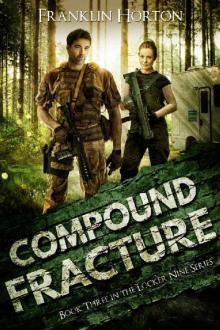 Compound Fracture
Compound Fracture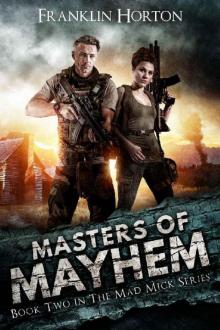 Masters of Mayhem
Masters of Mayhem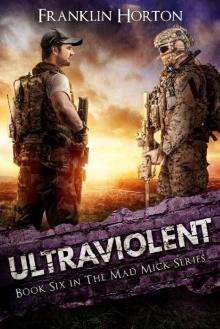 Ultraviolent: Book Six in The Mad Mick Series
Ultraviolent: Book Six in The Mad Mick Series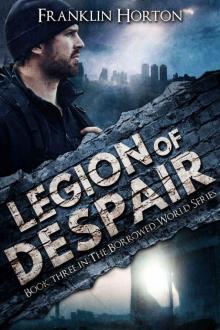 The Borrowed World (Book 3): Legion of Despair
The Borrowed World (Book 3): Legion of Despair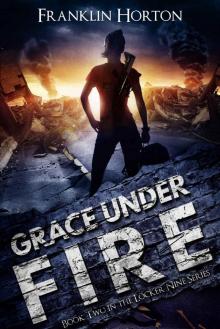 Grace Under Fire: Book Two In The Locker Nine Series
Grace Under Fire: Book Two In The Locker Nine Series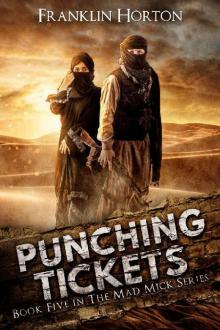 Punching Tickets: Book Five in The Mad Mick Series
Punching Tickets: Book Five in The Mad Mick Series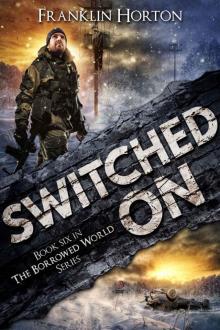 Switched On: Book Six in The Borrowed World Series
Switched On: Book Six in The Borrowed World Series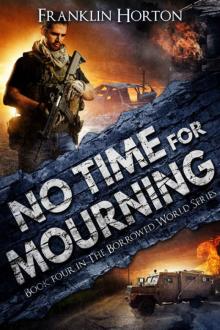 No Time For Mourning: Book Four in The Borrowed World Series
No Time For Mourning: Book Four in The Borrowed World Series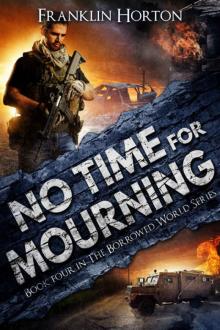 The Borrowed World (Book 4): No Time For Mourning
The Borrowed World (Book 4): No Time For Mourning Random Acts
Random Acts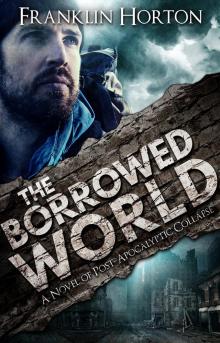 The Borrowed World: A Novel of Post-Apocalyptic Collapse
The Borrowed World: A Novel of Post-Apocalyptic Collapse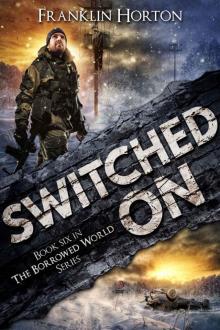 Switched On
Switched On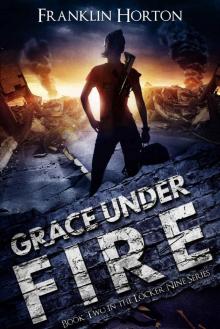 Grace Under Fire
Grace Under Fire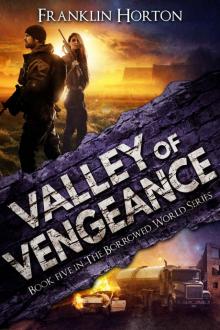 Valley of Vengeance: Book Five in The Borrowed World Series
Valley of Vengeance: Book Five in The Borrowed World Series